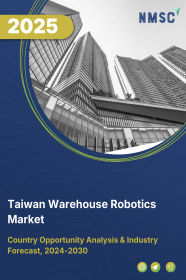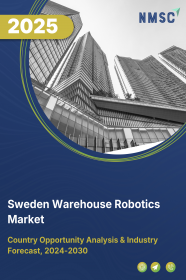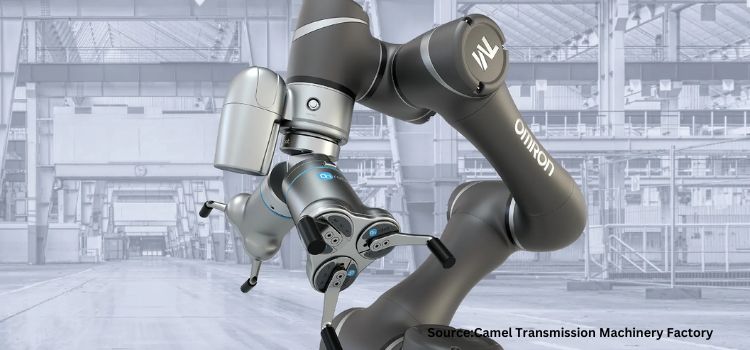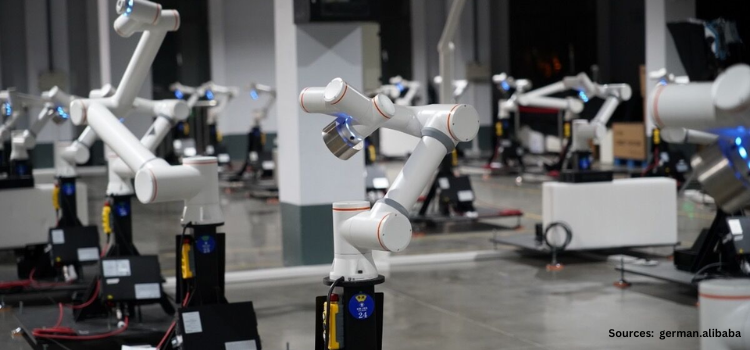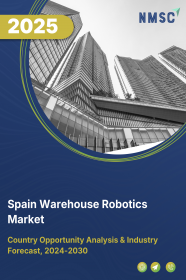
Spain Warehouse Robotics Market by Type (Automated Guided Vehicles (AGVs), Autonomous Mobile Robots (AMRs), Articulated Robots, & Others), by Offering (Hardware, Software, and Services), by Payload Capacity (Less than 100 KG, 101-200 KG, 201-500 KG, and Others), by Application (Palletizing and Depalletizing, Sorting and Packaging, Picking and Placing, Transportation), and by End-User (E-commerce, Automotive, Food & Beverages, and Others) – Opportunity Analysis and Industry Forecast, 2025–2030
Industry: Semiconductor & Electronics | Publish Date: 04-Apr-2025 | No of Pages: 149 | No. of Tables: 114 | No. of Figures: 59 | Format: PDF | Report Code : SE3177
Spain Warehouse Robotics Market Overview
The Spain Warehouse Robotics Market size was valued at USD 178.3 million in 2024, and is predicted to reach USD 450.0 million by 2030, at a CAGR of 15.4% from 2025 to 2030. In terms of volume, the market size was 8.72 thousand units in 2024 and is projected to reach 23.44 thousand units by 2030, with a CAGR of 16.5% from 2025 to 2030.
The progress towards modern automation through cutting-edge robotics sparks innovation in the country’s growing logistics and warehousing industries. With the growth in online shopping in Spain is fueling the growth of warehouse robotics market, as e-commerce companies pursue to improve efficacy and meet the increasing demand for faster delivery times and moreover with the acceleration of robotics innovation in Spain is powering the development of warehouse robotics market. However, resistance and talent gap are important factors restraining the growth of the warehouse robotics market in Spain.
Rise in Online Shopping Drives the Warehouse Robotics Market
The growth in online shopping is driving the Spain warehouse robotics market growth, as e-commerce companies pursue to improve efficacy and meet the increasing demand for faster delivery times. As there are more consumers shopping online, warehouse undergo pressure to handle larger volumes of orders and optimize inventory management. Thus, automated systems including robotics are organized to streamline sorting, packing and shipping methods, helping companies to keep up with the surge in orders. The European E-commerce Report 2024, the percentage of e-shoppers in Spain increased from 58% in 2019 to 69% in 2023.
Rise In Car Sales Drives the Warehouse Robotics
With the acceleration of robotics innovation in powering the development of Spain warehouse robotics market demand, as companies seek to improve their working efficacy and meet the demands of the modern supply chains. For example, in December 2023, Acceleration Robotics launched Robotcore ROS 2 hardware to enhance the development and deployment of robotic systems across various industries. This new hardware, based on ROS 2 offers improved capabilities for actual communication, reliability, and scalability, making it a striking option for robotics developers, thereby leading to market expansion.
Resistance in Workforce and Skill Gaps Restrains the Growth of the Market
The workforce resistance and skill gaps are important factors restraining the Spain warehouse robotics market trends. Fear related to job displacement due to automation creates battle among employees, leading to hesitancy in adopting warehouse robotics. Spain also faces a shortage of workers with the necessary expertise in robotics and automation technologies, delaying the smooth transition to automated warehousing systems. These challenges together slow down the adoption of warehouse robotics, slowing market growth.
Introduction of Artificial Intelligence Creates Future Option for the Market
The addition of artificial intelligence in warehouse robotics is expected to play a major role allowing growth opportunity for the market in the future. AI induced solutions improves decision making, optimize inventory management and improve the accuracy and speed of operations that helps warehouses to become more accurate and adaptable. As such in January 2025, Nvidia disclosed new AI development tools aimed at improving the potential of autonomous robots and vehicles. These models are mad to create synthetic data and simulate physical interactions, allowing developers to create designed templates for testing their AI systems before real-world. These progresses will focus on the transformative potential of AI in warehouse robotics, paving the way for smarter, more lively and highly efficient warehouse operations that meet the future demands of modern supply chain.
Competitive Landscape
The promising players operating in the Spain warehouse robotics industry includes ABB Ltd., Omron Corporation, KUKA AG, Fanuc Corporation, JBT Corporation, Zebra Technologies, Dematic, Vanderlande Industries B.V., KNAPP AG, YASKAWA ELECTRIC CORPORATION, Amazon Robotics LLC, Toshiba Corporation, SSI Schaefer Robotnik, PAL Robotics and others.
Spain Warehouse Robotics Market Key Segments
By Type
-
AGVs
-
AMRs
-
Articulated Robots
-
Others
By offering
-
Hardware
-
Software
-
Services
By Payload capacity
-
Less than 100 kg
-
101-200 KG
-
201-500 KG
-
Others
By Application
-
Palletizing and Depalletizing
-
Sorting and Packaging
-
Picking and Placing
-
Transportation
By End User
-
E-commerce
-
Automotive
-
Food & Beverages
-
Others
Key Players
-
ABB Ltd.
-
Omron Corporation
-
KUKA AG
-
Fanuc Corporation
-
JBT Corporation
-
Zebra Technologies
-
Dematic
-
Vanderlande Industries B.V.
-
KNAPP AG
-
YASKAWA ELECTRIC CORPORATION
-
Amazon Robotics LLC
-
Toshiba Corporation
-
SSI Schaefer
-
Robotnik
-
PAL Robotics
REPORT SCOPE AND SEGMENTATION:
|
Parameters |
Details |
|
Market Size Value in 2024 |
USD 178.3 million |
|
Revenue Forecast in 2030 |
USD 450.0 million |
|
Value Growth Rate |
CAGR of 15.4% from 2025 to 2030 |
|
Market Volume in 2024 |
8.72 thousand units |
|
Unit Forecast in 2030 |
23.44 thousand units |
|
Unit Forecast in 2030 |
CAGR of 16.5% from 2025 to 2030 |
|
Analysis Period |
2024–2030 |
|
Base Year Considered |
2024 |
|
Forecast Period |
2025–2030 |
|
Market Size Estimation |
Million (USD) |
|
Market Volume Estimation |
Thousand units |
|
Growth Factors |
|
|
Companies Profiled |
15 |
|
Market Share |
Available for 10 companies |
|
Customization Scope |
Free customization (equivalent up to 80 working hours of analysts) after purchase. Addition or alteration to country, regional, and segment scope. |
|
Pricing and Purchase Options |
Avail customized purchase options to meet your exact research needs. |

















 Speak to Our Analyst
Speak to Our Analyst




